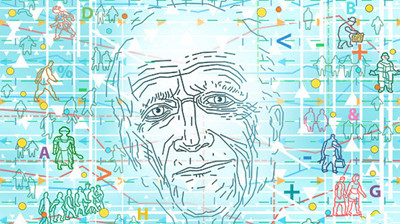自由交易
The great trailblazer
偉大的開拓者
Economists everywhere should mourn the passing of Gary Becker
世界各地的經濟學家都該對加里·貝克爾的離世表示哀悼
IF THERE is one person to blame for economists' habit of opining on everything, it is Gary Becker, who died on May 3rd. Not content with studying the world's economies, he was the first prominent economist to apply economic tools to all aspects of life. His revelation was the sort that seems obvious only in hindsight: that people are often purposeful and rational in their decisions, whether they are changing jobs, taking drugs or divorcing their spouses. This insight, and the work that followed from it, earned him a Nobel prize in 1992. No less an eminence than Milton Friedman declared in 2001 that Mr Becker was “the greatest social scientist who has lived and worked in the last half-century”.
經濟學家們習慣于對一切事情都發表意見,若要將這嗜好歸功于一人,這個人便是已于2014年5月3日辭世的加里·貝克爾。不滿足于僅僅研究世界經濟,貝克爾是第一個將經濟學方法應用到生活各個方面的著名經濟學家。他揭示了那些事后似乎才一目了然的事:無論是換工作,嗑藥或與配偶離婚,人們往往是有目的、理性地做出決定。正是由于此種見解以及其后一系列圍繞它的研究,貝克爾贏得了1992年的諾貝爾經濟學獎。聲名卓著的米爾頓·弗里德曼在2001年稱貝克爾是“過去的半個世紀以來最偉大的社會科學家”,他完全擔得起這個評價。

At the heart of Mr Becker's work was the view that “individuals maximise welfare as they conceive it.” Welfare need not mean income; it could derive from the pleasure of altruism or the thrill of deviancy. But critically, this thesis implied that people respond to incentives—a realisation that opened the door to insights across the whole range of human activity.
貝克爾研究的核心是認為“個體總是最大化他們自己所認為的個人福利”。福利不一定意味著收入,它可能源自利他主義的滿足感或越軌的快感。但關鍵的是,這個論題暗指人們會對激勵做出回應—這個認知為全方位地洞悉人類活動打開了一扇門。
Mr Becker first used this approach in his doctoral study of discrimination, a raw issue in 1950s America. At the time economists' models assumed that employers cared only about productivity, whatever the colour of the worker. Shunting this view aside, Mr Becker instead assumed that many individuals had a “taste for discrimination”, and perceived themselves to be worse off when forced to work alongside people of other races. He then explored how this preference affected labour markets.
貝克爾在其博士生涯研究歧視問題時第一次使用這種方法,歧視問題在20世紀50年代的美國還未受到重視。當時經濟學家的模型假定雇主只關心生產率,而不管工人的膚色如何。拋開這一觀點,貝克爾代之以假設許多人有“歧視偏好”,被迫與其他種族的人一起工作人們會感覺很糟糕。然后他探討了這種偏好如何影響勞動力市場。
In America, where the black population was roughly one-tenth of the total, discrimination against blacks led to relatively small reductions in white incomes but far more substantial ones for black workers. In South Africa, with a far higher proportion of blacks, discrimination brought much larger reductions in incomes across the economy. Mr Becker pointed out that although competition from more rational firms might gradually eliminate corporate discrimination, market forces alone would rarely erode discrimination rooted in the tastes of workers or consumers. His book on the subject, “The Economics of Discrimination”, became the foundation for subsequent research.
在美國,黑人數量占其總人口約十分之一,對黑人的歧視導致白人工人收入相對削減較小而黑人工人的工資卻較大幅度下降。在南非,黑人占比較高,歧視使整個經濟體的收入更大幅度的下挫。貝克爾指出,雖然那些來自更理性的公司的競爭可能逐步消除企業歧視,但僅僅依靠市場力量很難削弱根植于工人或消費者偏好中的歧視。他探討這一問題的書籍《歧視經濟學》為后續研究奠定了基礎。
Mr Becker's restless mind then focused on crime. He became intrigued after weighing the odds and cost of getting a parking ticket, and deciding to risk it. He looked sceptically on the view, common at the time, that crime was simply deviant behaviour—a form of mental illness. At least some of it, he reckoned, sprang from a rational consideration of perceived costs and benefits. Moral norms might inhibit some individuals from breaking the law, but others would overcome their qualms when the return to criminal activity was high, or the likely punishment mild. Such calculations would apply, he argued, across a wide variety of crimes, from parking scofflaws to corporate fraudsters.
思維活躍的貝克爾緊接著專注于犯罪領域。在比較了停車罰單的收益和成本并決定冒險違章停車后,這個問題引起了他的興趣。按照當時流行的觀點,犯罪只是簡單的越軌行為,貝克爾對此表示懷疑。他認為,至少部分犯罪是源自權衡成本和收益后的理性考量。道德準則可能會約束某些人不要去違法亂紀,但若犯罪活動回報頗高,或潛在處罰輕微時,其他人還是會將諸般疑慮拋諸腦后的。他認為這種方式也適用于衡量各種不同的犯罪,從違章停車到企業詐騙。
Mr Becker puzzled over why crime was economically costly. Part of the answer, he realised, was that it represents rent-seeking: fighting over the spoils of productive activity rather than creation of new wealth. Resources invested in commission of crimes might otherwise have gone towards growth-boosting activity. His work contributed to new crime-fighting methods. He reckoned there is an optimal amount of crime in society, since it makes little sense to pay huge sums to wipe out illegal activity carrying low social costs. Where enforcement is patchy, governments might still deter misbehaviour by increasing the severity of the punishment—by raising fines, say.
貝克爾對犯罪為何在經濟上代價高昂感到困惑。他意識到部分原因在于犯罪是一種“尋租”行為:爭食生產活動的戰利品,而非創造新的財富。否則,實施犯罪(或阻止犯罪)投入的資源本可用來促進生產活動。他的研究成果為新的打擊犯罪的方式做出了貢獻。貝克爾認為,由于支付巨額資金以杜絕低社會成本的非法活動意義不大,社會上的犯罪有著最優量。凡執法存在漏洞的地方,政府仍可能通過加大懲罰力度以震懾不端行為—比如增加罰金。
Mr Becker was again a pioneer, alongside his Columbia University colleague Jacob Mincer, in developing the concept of “human capital”, the investments individuals make in their own education. Mr Becker ventured that spending on education and training should be thought of as an economic choice, made in anticipation of perceived future gains, rather than a high-minded search for cultural enrichment. His view gave insight into labour-market oddities. By taking into account the difference between general knowledge and “firm-specific” skills, Mr Becker could explain why skilled workers are less likely to change firms, or why firms are more likely to promote from within. Human capital also shed light on gaps in pay across demographic groups—between men and women, for example. That, in turn, shaped Mr Becker's groundbreaking study on the economics of the family.
貝克爾與其哥倫比亞大學的同事雅各布·明賽爾一起發展了“人力資本”的概念,即個體為自身教育做出的投資。他在這方面再次成為先驅。貝克爾大膽假設,用于教育和培訓的開銷應當被看作是一種在預期未來收益的情況下做出的經濟選擇,而非為了尋求提升高尚的文化修養。這一觀點給勞動力市場怪象提供了視角。考慮到通識知識(比如數學)和“企業特有”技能(如內部軟件知識)之間的差別,貝克爾可以解釋為什么技術工人不太可能跳槽,或者企業為什么更青睞從內部提拔人才。人力資本也揭示出人口群體——比如男性和女性間的薪酬差異,這反過來形成貝克爾對家庭經濟的開創性研究。
Family values
家庭價值觀
Mr Becker brought his characteristic analysis to the question, assuming that people are guided in family choices by a desire to improve their own welfare. That included marriage and divorce: his analysis implied, for instance, that those in wealthy families would divorce at lower rates, a prediction borne out by data. His work also helped explain falling fertility in rich countries. As wages rise, the opportunity cost of raising children increases, and large families become less attractive. What is more, as the link between education and economic success grows stronger, parents invest ever more in their children.
分析這個問題,貝克爾引入了他的特性分析,假設人是出于提高自身福利的愿望來指導家庭選擇的,包括結婚和離婚在內。舉個例子,他的分析暗示那些富裕家庭往往離婚率較低,數據也證實了這一預測。他的工作也有助于解釋富裕國家出生率下降的問題。隨著工資的上升,撫養子女的機會成本增加,擁有一個大家庭變得不那么有吸引力。更重要的是,教育與經濟成功之間的聯系變得更加強大,父母在子女身上的投資越來越多。
Mr Becker's trailblazing earned plenty of criticism. The interdisciplinary adventurism it embodied peeved other social scientists, who doubted that cool-headed analysis played much part in matters of love or larceny. But his work yielded unexpected insights and forced social scientists to rethink their assumptions and sharpen their analyses, the better to learn why people behave as they do and how policy can best help. Whole branches of microeconomics owe their existence to him. It is hard to imagine a more welfare-improving contribution.
貝克爾的開創性理論遭到了很多批評。它體現出的跨學科冒險性使許多社會科學家非常氣惱,他們懷疑冷靜分析在愛情或盜竊問題起到的作用會更大。但貝克爾的研究成果提供了出人意料的思路,迫使社會科學家重新考慮他們的假設,完善他們的分析,以更好地了解人們的行為:人們為何那么做,政策怎樣提供最好的幫助。微觀經濟學的整個分支的存在都歸功于貝克爾,沒有誰在提升福利方面作出的貢獻比他更大了。












